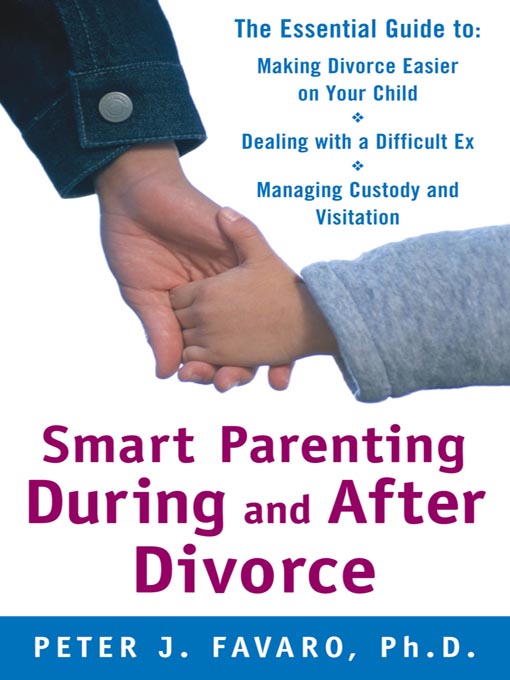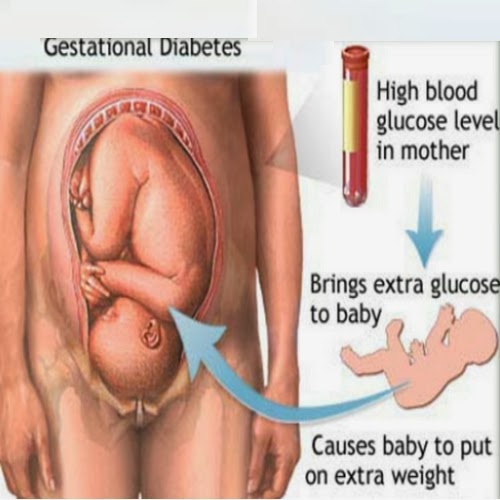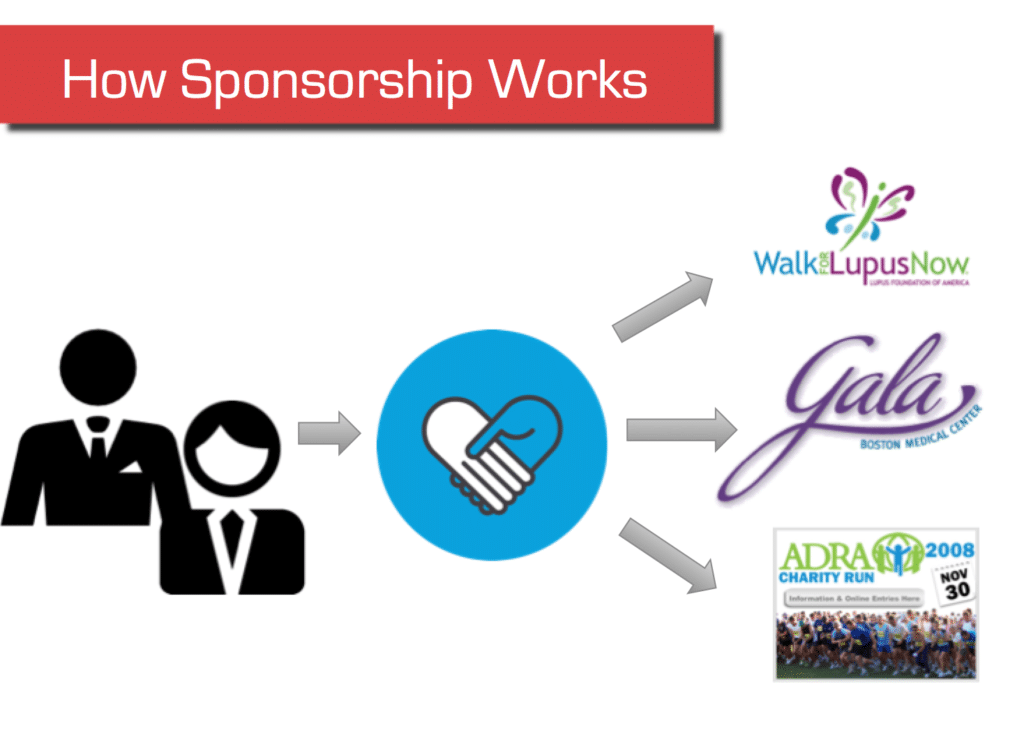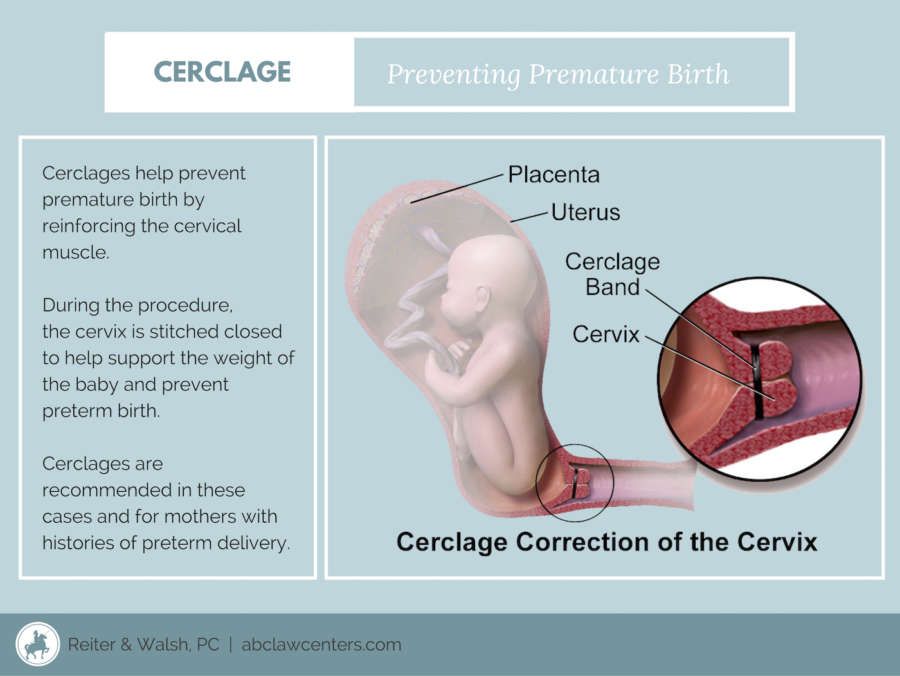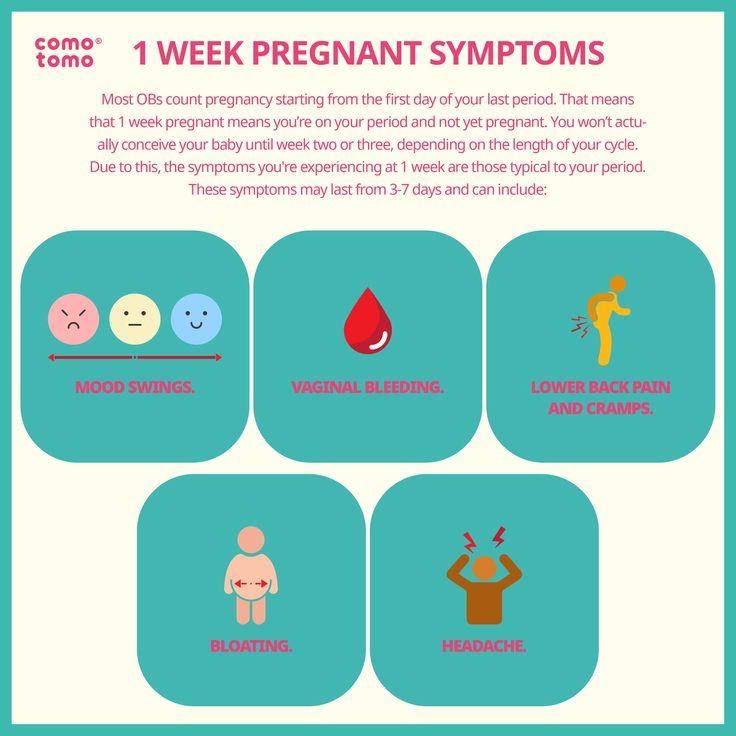How to help a child going through divorce
Supporting Kids During a Divorce
One of the biggest priorities during a divorce is ensuring that children continue to thrive. While it is undeniable that divorces are challenging for kids of all ages to handle, the good news is that there is a lot that parents can do to make sure their children feel supported during the process.
Once you’ve told your kids that you’re getting a divorce, it’s common for them to go through an adjustment period. You, too, will likely be going through a period of adjustment as family bonds are being reconfigured and a new “normal” is established.
Stephanie Samar, PsyD, a child psychologist, recommends not being too alarmed by some of the reactions you may be seeing early in the transition. “Think about how chaotic it feels for the adults in the situation, who have at least some control,” she notes. “That adjustment period has to happen, so honor it and don’t start to send the message ‘I just want you to be happy.’” You don’t want to inadvertently pressure kids to feel like they need to be on board and happy about a divorce. While it may be true, of course, that you just want your kids to be happy as soon as possible, giving them the room to process their own feelings is an important part of adjusting.
Respect their emotions
One way to let kids know that it’s okay to feel upset or angry is to encourage them to share how they’re feeling. Dr. Samar recommends saying, “We want to know how you’re feeling about this, and you’re not going to hurt our feelings if you tell us how you feel.”
This may be easier said than done, since what your child has to say might be difficult to hear, but it’s important to give her the chance to be honest. Kids sometimes try to protect their parents from the truth about how they’re feeling because they don’t want to make their parents feel upset — or more upset, if kids are already worried about a parent who’s unhappy about the break-up. But it isn’t a child’s job to make a parent feel better, and you don’t want to inadvertently send the message that you will be sad if your child is sad.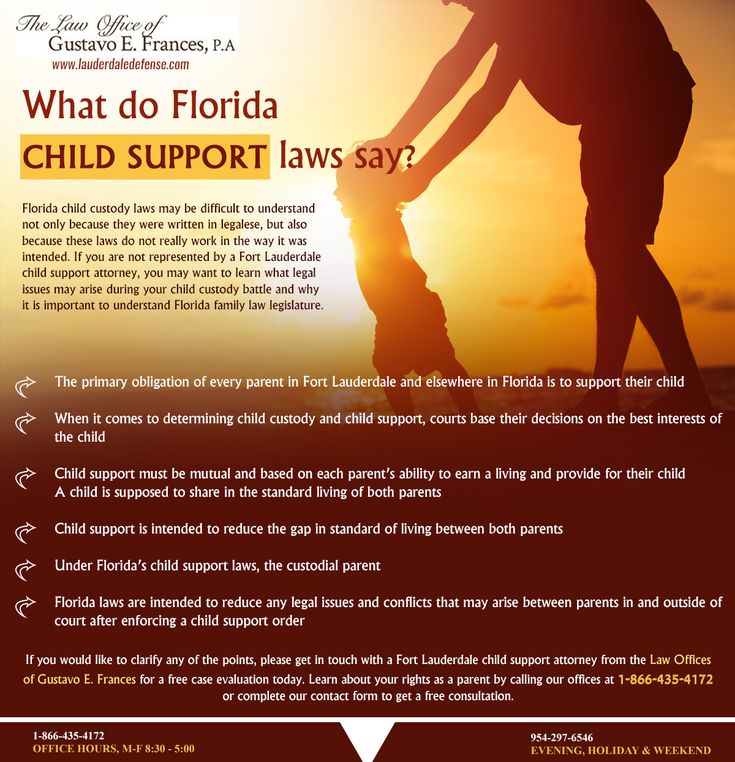 Make it clear that you are interested in what your child has to say and, as Dr. Samar says, “then be careful not to let it hurt your feelings. Get whatever support you need to deal with how you feel and how your child feels and how that impacts you.”
Make it clear that you are interested in what your child has to say and, as Dr. Samar says, “then be careful not to let it hurt your feelings. Get whatever support you need to deal with how you feel and how your child feels and how that impacts you.”
As part of respecting your child’s emotions, do your best to just listen and not intervene. It’s every parent’s instinct to jump in and protect their child from things that are painful, but divorce is inevitably painful. Taking a step back and just listening allows your child to feel heard and feel that her opinion matters. It also lets her know that her emotions aren’t a problem to be solved or “gotten over.” This requires careful listening and empathizing, which psychologists call “validation.” For example, if your daughter says she is angry, instead of immediately looking for a way to cheer her up, you could validate that emotion by saying that you understand why she might feel that way and invite her to tell you more.
What to expect, and how to respond
While it is normal for kids to have an adjustment period in which they might be struggling, there are things you can do to help your kids cope in the healthiest way possible. Here are some common worries or behaviors parents might see, and how to help.
Here are some common worries or behaviors parents might see, and how to help.
Guilt
It is common for kids to worry that they did something to cause their parents to get divorced, especially younger kids, notes Jamie Howard, PhD, a clinical psychologist at the Child Mind Institute. “Kids are more prone to blaming themselves when they’re younger because they’re so egocentric,” says Dr. Howard. “Even if you think they understand it, that’s something you want to make sure that you tell them explicitly: It’s not their fault.”
Anxiety
Divorce means some fundamental changes in routines, which can make many kids anxious. If you notice signs of anxiety in your children, one way to help is to make it very clear to children what they can expect. For example, what will their new living arrangements look like? For younger kids, it might help to post a calendar on the wall to show them where they will be each day.
Children will be reassured if you are able to establish a consistent routine, and as a parent you should make that a priority.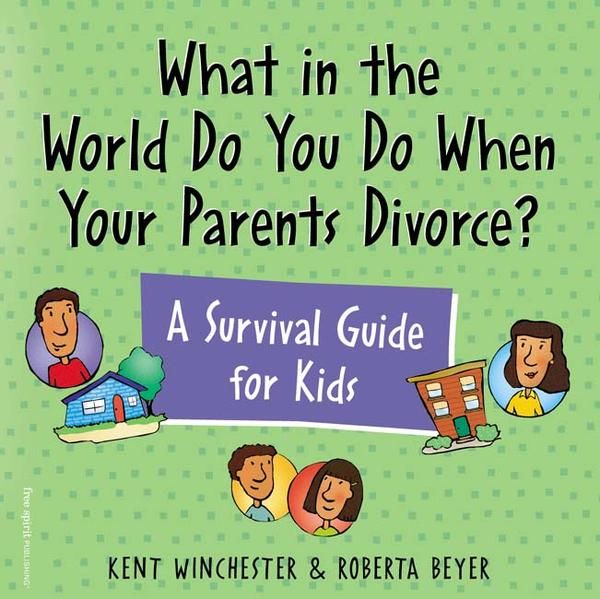 “We see kids struggle more if their parents are struggling to figure out how to co-parent and what that’s going to look like,” says Dr. Samar. “So the earlier that you can establish ‘You’ll be here for these days and here for these days’ and have that be consistent and predictable, you’ll see kids settling in quicker and having less struggle.”
“We see kids struggle more if their parents are struggling to figure out how to co-parent and what that’s going to look like,” says Dr. Samar. “So the earlier that you can establish ‘You’ll be here for these days and here for these days’ and have that be consistent and predictable, you’ll see kids settling in quicker and having less struggle.”
Behavior issues
Children may start acting out more, too. This may be another sign of anxiety or it may be out of a desire to figure out what the new boundaries are. Either way, creating a structured environment with clear expectations of behavior should help.
“Kids might see this as an opportunity to test new boundaries, and without as much of a structured environment, their behavior might get worse. As much as possible keep things structured in the same way in both households,” Dr. Howard advises.
RegressionIt is also common for kids to respond to a big transition in their lives by needing more parental attention. “Some kids will be needing more parental and adult support with things they used to be able to do independently,” says Dr. Samar. “You might see their sleep routine is disrupted or they’ll need you to do some self-care things for them a bit more than they used to.”
“Some kids will be needing more parental and adult support with things they used to be able to do independently,” says Dr. Samar. “You might see their sleep routine is disrupted or they’ll need you to do some self-care things for them a bit more than they used to.”
Withdrawing
Parents might also see the opposite — kids becoming more withdrawn or aloof. While giving children their space is important, you still want to create opportunities to spend time with them, so consider suggesting a special outing that may be particularly appealing or other ways to bond. Make sure, too, to do your best to be available to talk if your child wants to, and do a good job listening to what he has to say when he does.
If you notice that your child is losing interest in activities that he used to enjoy, or not wanting to spend time with friends, try to get him back on track. You want to help maintain a sense of normalcy, and these outlets are important. Wanting to withdraw may also be a sign of depression, adjustment disorder or school refusal, which are all linked to divorce, so you will want to keep an eye out if your child continues to avoid things.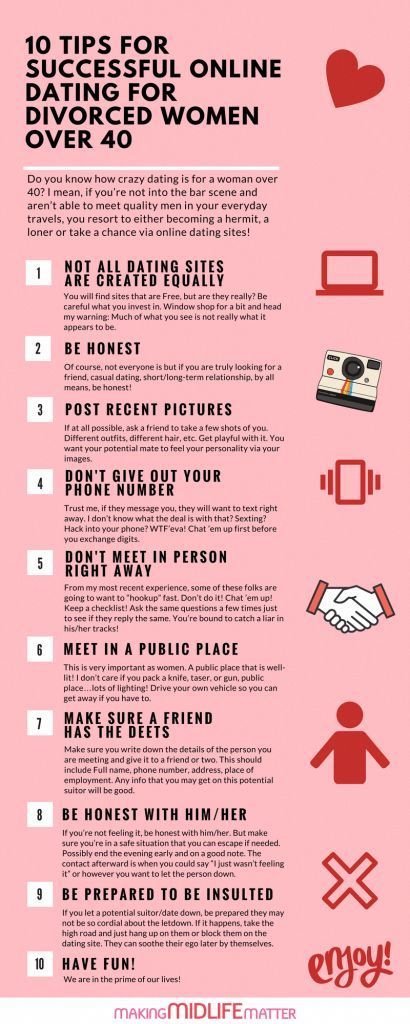
Trouble focusing
Some kids may also start experiencing difficulty concentrating on school work. Life might be feeling very chaotic, so do your best to create predictable, reassuring routines at home, including a regular homework routine. It’s also a good idea to alert teachers to the fact that your family is going through a divorce, so that your child can get extra support at school if she needs it.
Good parenting tips during a divorce
Model calm: As much as possible, you want to model “we’ve got this,” says Dr. Howard. “Even if it’s not true, even if only one parent has got this. Particularly if you have young children, then you get it to work.” Modeling calm and insulating children from conflict are important during this time. Likewise, try to maintain as much normalcy as possible with home life and extracurricular activities. When changes do need to be made, create new routines and try to stick to them.
Be civil about your ex: It’s not healthy for children to have unnecessary conflict in their relationships with their parents, so do your best not to speak negatively about your spouse around your child.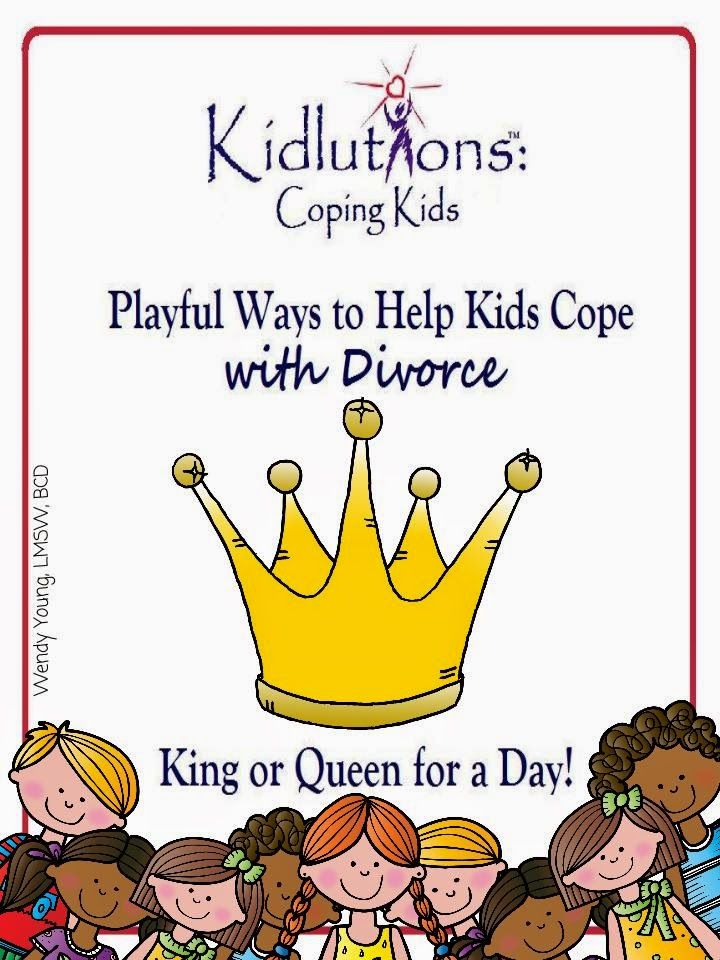 “Someone could be a lousy spouse and a good parent,” notes Dr. Howard, “and you really don’t want to deprive your child of a good parent. Kids do better with two loving parents, divorced or married.”
“Someone could be a lousy spouse and a good parent,” notes Dr. Howard, “and you really don’t want to deprive your child of a good parent. Kids do better with two loving parents, divorced or married.”
Sometimes conflict can arise once you begin working out how to co-parent. You may need to make compromises or take turns making decisions. Whatever you do, try to present a united front to your child as much as possible. If your spouse really isn’t willing to be cooperative, do your best to set routines and expectations for your home, since you do have control over that.
Get support: Talk to your child’s school counselor or teacher to find out if there are any services available through the school. Many schools have programs for children who are going through a divorce, such as Banana Splits, which is a divorce support group for kids.
Also, if you are struggling, make sure you are getting support for yourself. Talk to your friends and family if you are feeling overwhelmed and ask for favors if you need them.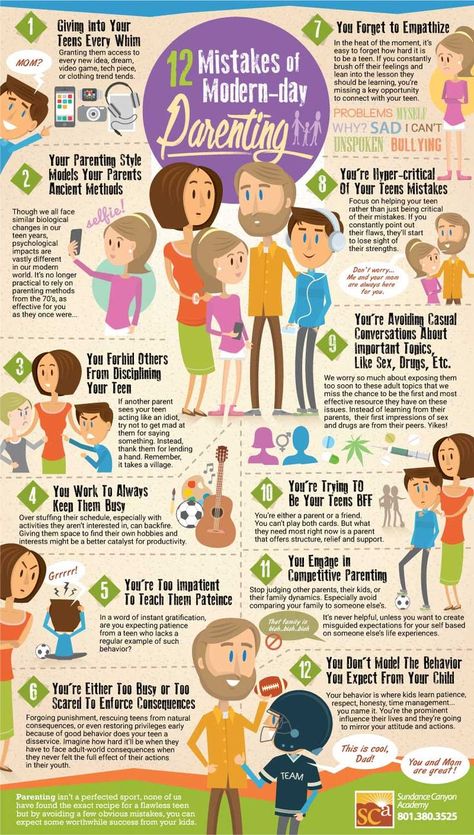 People often want to help out, but they don’t know what to do, so let them know if you need a hand with the groceries or just want to let off some steam. If you think you might benefit from talking with a therapist, don’t hesitate to make an appointment. Remember, you can best support your child if you are feeling supported, too.
People often want to help out, but they don’t know what to do, so let them know if you need a hand with the groceries or just want to let off some steam. If you think you might benefit from talking with a therapist, don’t hesitate to make an appointment. Remember, you can best support your child if you are feeling supported, too.
Children and Divorce - HelpGuide.org
parenting
For children, separation and divorce can be an especially sad, stressful, and confusing time. But there are ways to help your kids cope with the upheaval of a breakup.
Helping your child through a divorce
A separation or divorce is a highly stressful and emotional experience for everyone involved, but children often feel that their whole world has turned upside down. At any age, it can be traumatic to witness the dissolution of your parents’ marriage and the breakup of the family. Kids may feel shocked, uncertain, or angry. Some may even feel guilty, blaming themselves for the problems at home.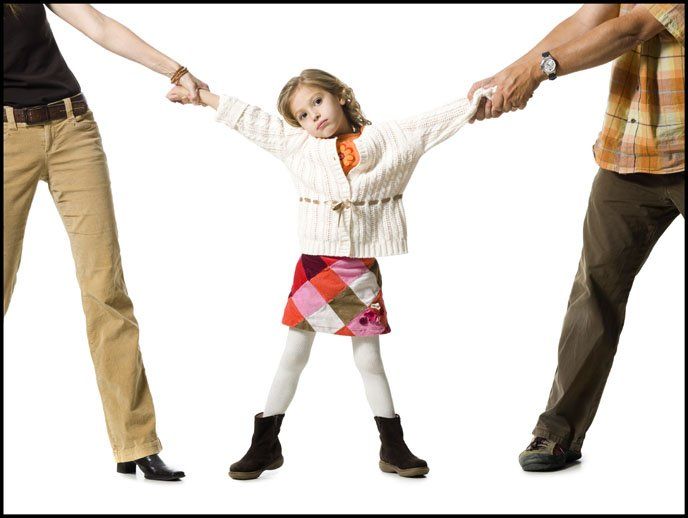 Divorce is never a seamless process and, inevitably, such a transitional time doesn’t happen without some measure of grief and hardship. But you can dramatically reduce your children’s pain by making their well-being your top priority.
Divorce is never a seamless process and, inevitably, such a transitional time doesn’t happen without some measure of grief and hardship. But you can dramatically reduce your children’s pain by making their well-being your top priority.
Your patience, reassurance, and listening ear can minimize tension as your children learn to cope with unfamiliar circumstances. By providing routines your kids can rely on, you remind them that they can count on you for stability, structure, and care. And by maintaining a working relationship with your ex, you can help your kids avoid the stress and anguish that comes with watching parents in conflict. With your support, your kids can not only successfully navigate this unsettling time, but even emerge from it feeling loved, confident, and strong—and even with a closer bond to both parents.
How to tell kids about divorce
When it comes to telling your kids about your divorce, many parents freeze up. Make the conversation a little easier on both yourself and your children by preparing what you're going to say before you sit down to talk.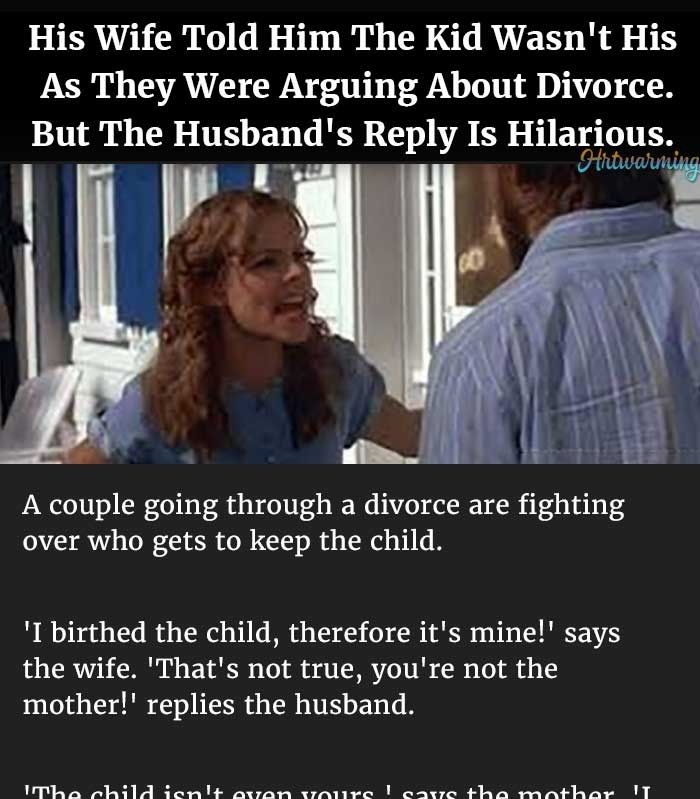 If you can anticipate tough questions, deal with your own anxieties ahead of time, and plan carefully what you'll be telling them, you will be better equipped to help your children handle the news.
If you can anticipate tough questions, deal with your own anxieties ahead of time, and plan carefully what you'll be telling them, you will be better equipped to help your children handle the news.
What to say and how to say it
Difficult as it may be, try to strike an empathetic tone and address the most important points right up front. Give your children the benefit of an honest—but kid-friendly—explanation.
Tell the truth. Your kids are entitled to know why you are getting a divorce, but long-winded reasons may only confuse them. Pick something simple and honest, like “We can't get along anymore.” You may need to remind your children that while sometimes parents and kids don't always get along, parents and kids don't stop loving each other or get divorced from each other.
Say “I love you.” However simple it may sound, letting your children know that your love for them hasn't changed is a powerful message. Tell them you'll still be caring for them in every way, from fixing their breakfast to helping them with homework.
Address changes. Preempt your kids' questions about changes in their lives by acknowledging that some things will be different, and other things won't. Let them know that together you can deal with each detail as you go.
Avoid blaming
It's vital to be honest with your kids, but without being critical of your spouse. This can be especially difficult when there have been hurtful events, such as infidelity, but with a little diplomacy, you can avoid playing the blame game.
Present a united front. As much as you can, try to agree in advance on an explanation for your separation or divorce—and stick to it.
Plan your conversations. Make plans to talk with your children before any changes in the living arrangements occur. And plan to talk when your spouse is present, if possible.
Show restraint. Be respectful of your spouse when giving the reasons for the separation.
How much information should I give my child about the divorce?
Especially at the beginning of your separation or divorce, you'll need to pick and choose how much to tell your children. Think carefully about how certain information will affect them.
Think carefully about how certain information will affect them.
- Be age-aware. In general, younger children need less detail and will do better with a simple explanation, while older kids may need more information.
- Share logistical information. Do tell kids about changes in their living arrangements, school, or activities, but don't overwhelm them with the details.
- Keep it real. No matter how much or how little you decide to tell your kids, remember that the information should be truthful above all else.
With over 25,000 licensed counselors, BetterHelp has a therapist that fits your needs. It's easy, affordable, and convenient.
GET 20% OFF
Online-Therapy.com is a complete toolbox of support, when you need it, on your schedule. It only takes a few minutes to sign up.
GET 20% OFF
Teen Counseling is an online therapy service for teens and young adults. Connect with your counselor by video, phone, or chat.
GET 20% OFF
Help your child grieve the divorce
For kids, divorce can feel like an intense loss—the loss of a parent, the loss of the family unit, or simply the loss of the life they knew. You can help your children grieve their loss and adjust to new circumstances by helping them express their emotions.
[Read: Coping with Grief and Loss]
Listen. Encourage your child to share their feelings and really listen to them. They may be feeling sadness, loss or frustration about things you may not have expected.
Help them find words for their feelings. It's normal for children to have difficulty expressing their feelings. You can help them by noticing their moods and encouraging them to talk.
Let them be honest. Children might be reluctant to share their true feelings for fear of hurting you. Let them know that whatever they say is okay. They may blame you for the divorce but if they aren't able to share their honest feelings, they will have a harder time working through them.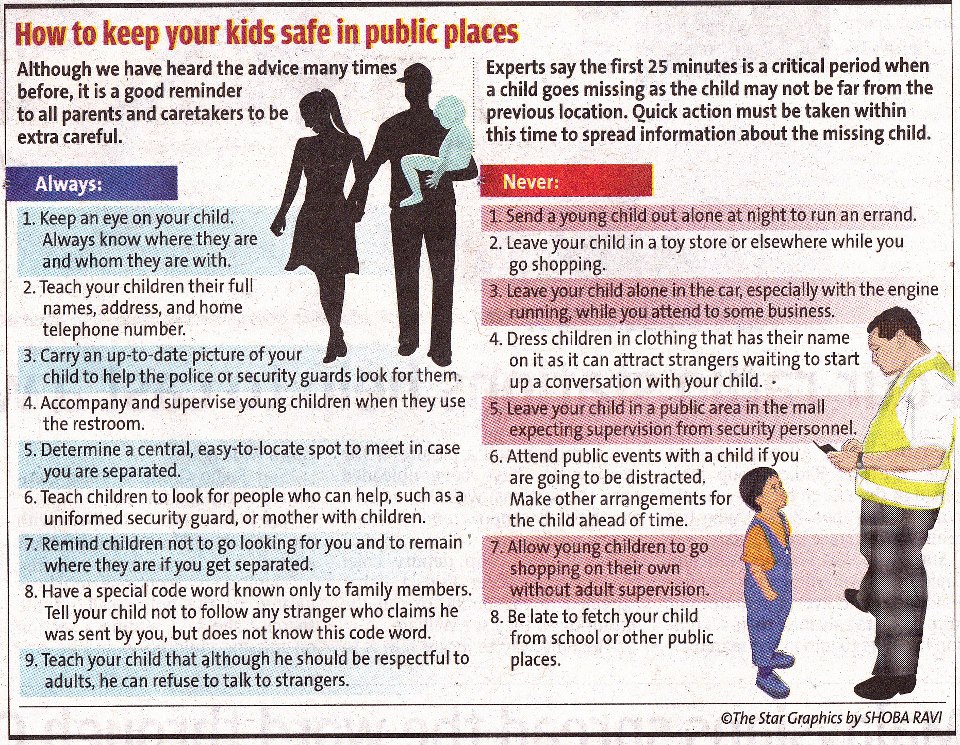
Make talking about the divorce an ongoing process. As children age and mature, they often have new questions, feelings, or concerns about what happened, so you may want to go over the same ground again and again.
Acknowledge their feelings. You may not be able to fix their problems or change their sadness to happiness, but it is important for you to acknowledge their feelings rather than dismissing them. You can also inspire trust by showing that you understand.
Let kids know they're not at fault
Many kids believe that they had something to do with the divorce, recalling times they argued with their parents, received poor grades, or got in trouble. To help your kids let go of this misconception:
Set the record straight. Repeat why you decided to get a divorce. Sometimes hearing the real reason for your decision can help.
Be patient. Kids may seem to “get it” one day and feel unsure the next. Treat your child's confusion or misunderstandings with patience.
Treat your child's confusion or misunderstandings with patience.
Reassure. As often as you need to, remind your children that both parents will continue to love them and that they are not responsible for the divorce.
Give reassurance and love
Children have a remarkable ability to heal when given the support and love they need. Your words, actions, and ability to remain consistent are all important tools to reassure your children of your unchanging love.
Both parents will be there. Let your kids know that even though the physical circumstances of the family unit will change, they can continue to have healthy, loving relationships with both of their parents.
It'll be okay. Tell kids that things won't always be easy, but they will work out. Knowing everything will be alright can provide incentive for your kids to give a new situation a chance.
Closeness. Physical closeness—in the form of hugs, pats on the shoulder, or simple proximity—has a powerful way of reassuring your child of your love.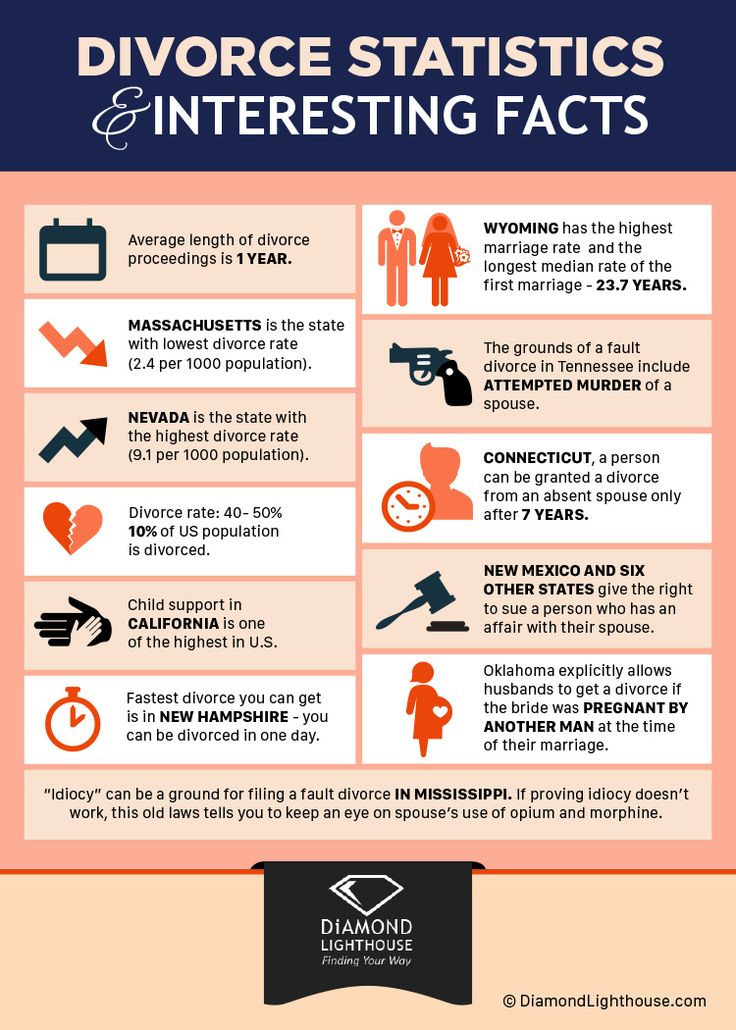
Be honest. When kids raise concerns or anxieties, respond truthfully. If you don't know the answer, say gently that you aren't sure right now, but that you'll find out and it will be okay.
Provide stability through the divorce
While it's good for kids to learn to be flexible, adjusting to many new circumstances at once can be very difficult. Help your kids adjust to change by providing as much stability and structure as possible in their daily lives.
Remember that establishing structure and continuity doesn't mean that you need rigid schedules or that mom and dad's routines need to be exactly the same. But creating some regular routines at each household and consistently communicating to your children what to expect will provide your kids with a sense of calm and stability.
The comfort of routines
Kids feel safer and more secure when they know what to expect next. Knowing that, even when they switch homes, dinnertime is followed by homework and then a bath, for example, can set a child's mind at ease.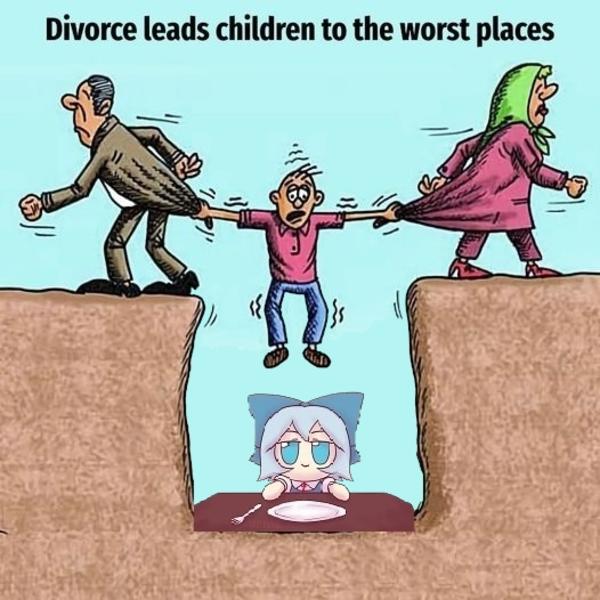
Maintaining routine also means continuing to observe rules, rewards, and discipline with your children. Resist the temptation to spoil kids during a divorce by not enforcing limits or allowing them to break rules.
Take care of yourself
The first safety instruction for an airplane emergency is to put the oxygen mask on yourself before you put it on your child. When it comes to helping your kids through your divorce, the take home message is: take care of yourself so that you can be there for your kids.
Coping with your divorce or breakup
The breakup of a relationship can trigger all sorts of painful and unsettling emotions. As well as grieving the loss of your relationship, you may feel confused, isolated, and fearful about the future. By learning how to cope with the pain of a separation or divorce in healthy ways, you'll be better able to stay calm and help your kids feel more at ease.
[Read: Dealing with a Breakup or Divorce]
Exercise often and eat a healthy diet.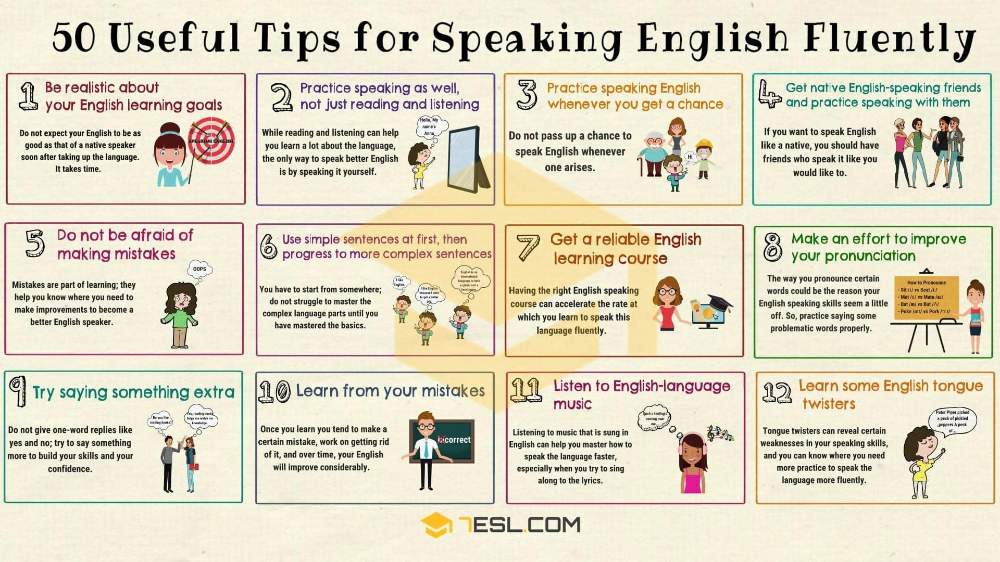 Exercise relieves the pent-up stress and frustration that's commonplace with divorce. And although cooking at home (or learning to cook for one) involves more effort than ordering in, eating healthfully will make you feel better, inside and out—so skip the junk and convenience food.
Exercise relieves the pent-up stress and frustration that's commonplace with divorce. And although cooking at home (or learning to cook for one) involves more effort than ordering in, eating healthfully will make you feel better, inside and out—so skip the junk and convenience food.
See friends often. It may be tempting to hole up and avoid seeing friends and family who will inevitably ask about the divorce—but the reality is that face-to-face support from others is vital for relieving the stress of a breakup and getting you through this difficult time. If you don't want to talk about your breakup, just ask friends to avoid the topic; they'll understand.
Keep a journal. Writing down your feelings, thoughts, and moods can help you release tension, sadness, and anger. As time passes, you can look back on just how far you've come.
Seek support
At the very least, divorce is complicated and stressful—and can be devastating without support.
Lean on friends. Talk face-to-face with friends or a support group about any difficult emotions you're feeling—such as bitterness, anger, frustration—so you don't take it out on your kids. If you've neglected your social circle while being married and don't feel you have anyone to confide in, it's never too late to build new friendships.
Never vent negative feelings to your child. Whatever you do, do not use your child to talk it out like you would with a friend.
Keep laughing. Try to inject humor and play into your life and the lives of your children as much as you can; it can relieve stress and give you all a break from sadness and anger.
See a therapist. If you are feeling intense anger, fear, grief, shame, or guilt, find a professional to help you work through those feelings.
Work with your ex
Conflict between parents—separated or not—can be very damaging for kids. It's crucial to avoid putting your children in the middle of your fights, or making them feel like they have to choose between you. The following tips can save your kids a lot of heartache.
The following tips can save your kids a lot of heartache.
Take it somewhere else. Never argue in front of your children, whether it's in person or over the phone. Ask your ex to talk another time, or drop the conversation altogether.
Use tact. Refrain from talking with your children about details of the other parent's behavior. It's the oldest rule in the book: if you don't have anything nice to say, don't say anything at all.
Be nice. Be polite in your interactions with your ex-spouse. This not only sets a good example for your kids but can also encourage your ex to be gracious in response.
Look on the bright side. Choose to focus on the strengths of all family members. Encourage children to do the same.
Work on it. Make it a priority to develop an amicable relationship with your ex-spouse as soon as possible. Watching you be friendly can reassure children and teach problem-solving skills as well.
Resolving parenting conflicts with your ex
If you find yourself, time after time, locked in battle with your ex over the details of parenting, try to step back and remember the bigger purpose at hand.
[Read: Co-Parenting Tips for Divorced Parents]
Remind yourself: what's best for your kids in the long run? Having a good relationship with both parents throughout their lives.
Think ahead in order to stay calm. If you can keep long-term goals in mind—your children's physical and mental health, your independence—you may be able to avoid disagreements about daily details.
Consider everyone's well-being. The happiness of your children, yourself, and, yes, even your ex, should be the broad brushstrokes in the big picture of your new lives after divorce.
Professional help for kids following divorce
Some children go through divorce with relatively few problems, while others have a very difficult time.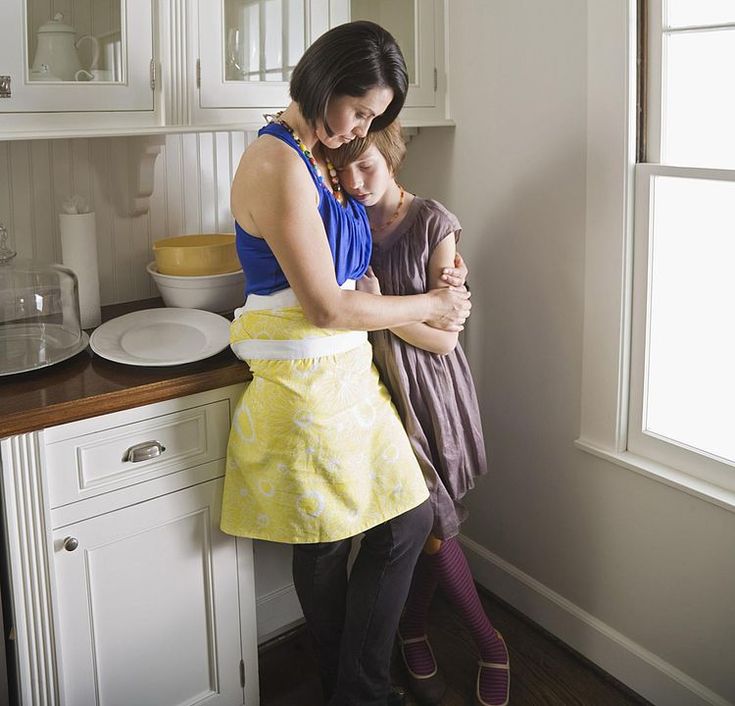 It's normal for kids to feel a range of difficult emotions, but time, love, and reassurance should help them to heal. If your kids remain overwhelmed, though, you may need to seek professional help.
It's normal for kids to feel a range of difficult emotions, but time, love, and reassurance should help them to heal. If your kids remain overwhelmed, though, you may need to seek professional help.
Normal reactions to divorce or separation
Although strong feelings can be tough on kids, the following reactions are normal for children following divorce.
- Anger. Your kids may express their anger, rage, and resentment with you and your spouse for destroying their sense of normalcy.
- Anxiety. It's natural for children to feel anxious when faced with big changes in their lives.
- Mild depression. Sadness about the family's new situation is normal, and sadness coupled with a sense of hopelessness and helplessness is likely to become a mild form of depression.
It will take some time for your kids to work through their issues about the separation or divorce, but you should see gradual improvement over time.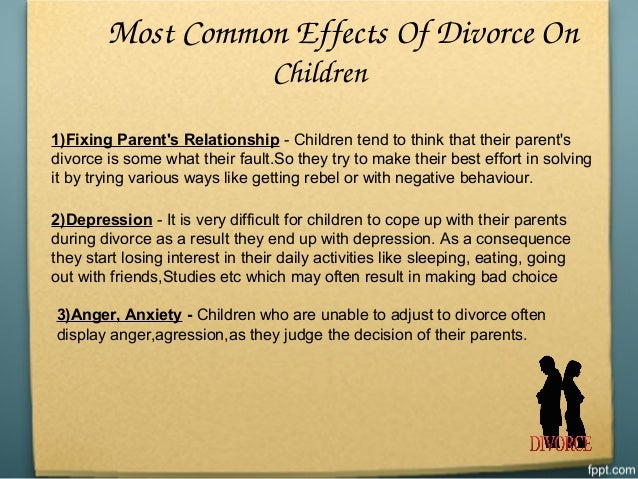
Red flags for more serious problems
If things get worse rather than better after several months following your divorce, it may be a sign that your child is stuck in depression, anxiety, or anger and could use some additional support. Watch for these warning signs of divorce-related depression or anxiety in kids:
- Sleep problems
- Poor concentration
- Trouble at school
- Drug or alcohol abuse
- Self-injury, cutting, or eating disorders
- Frequent angry or violent outbursts
- Withdrawal from loved ones
- Disinterest in loved activities
Discuss these or other divorce-related warning-signs with your child's doctor, teachers, or consult a child therapist for guidance on coping with specific problems.
Authors: Gina Kemp, M.A., Melinda Smith, M.A., and Jeanne Segal, Ph.D.
- References
Anderson, J.
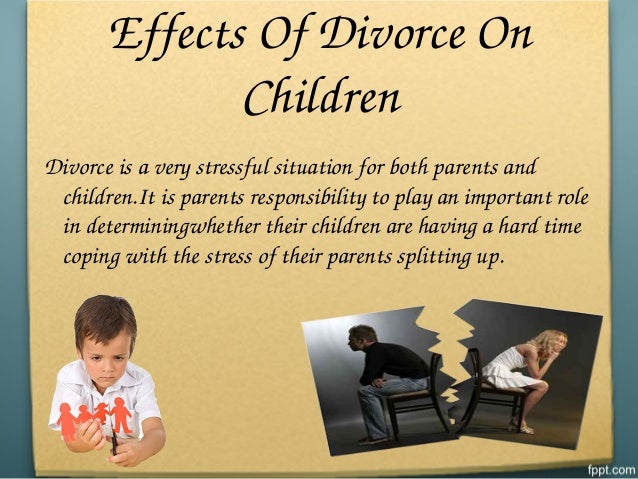 (2014). The Impact of Family Structure on the Health of Children: Effects of Divorce. The Linacre Quarterly, 81(4), 378–387. https://doi.org/10.1179/0024363914Z.00000000087
(2014). The Impact of Family Structure on the Health of Children: Effects of Divorce. The Linacre Quarterly, 81(4), 378–387. https://doi.org/10.1179/0024363914Z.00000000087Children and Divorce. (n.d.). Retrieved July 13, 2022, from https://www.aacap.org/AACAP/Families_and_Youth/Facts_for_Families/FFF-Guide/Children-and-Divorce-001.aspx
Helping Children Understand Divorce | MU Extension. (n.d.). Retrieved July 13, 2022, from https://extension.missouri.edu/catalog/product/view/id/2280/
How to Talk to Your Children about Divorce—HealthyChildren.org. (n.d.). Retrieved July 13, 2022, from https://www.healthychildren.org/English/healthy-living/emotional-wellness/Building-Resilience/Pages/How-to-Talk-to-Your-Children-about-Divorce.aspx
Helping Your Child Through a Divorce – Information on coping with divorce. (KidsHealth)
Tips for Divorcing Parents – Suggestions about communicating with your child after a split. (KidsHealth)
Helping Children Understand Divorce – Tips for talking with children about divorce.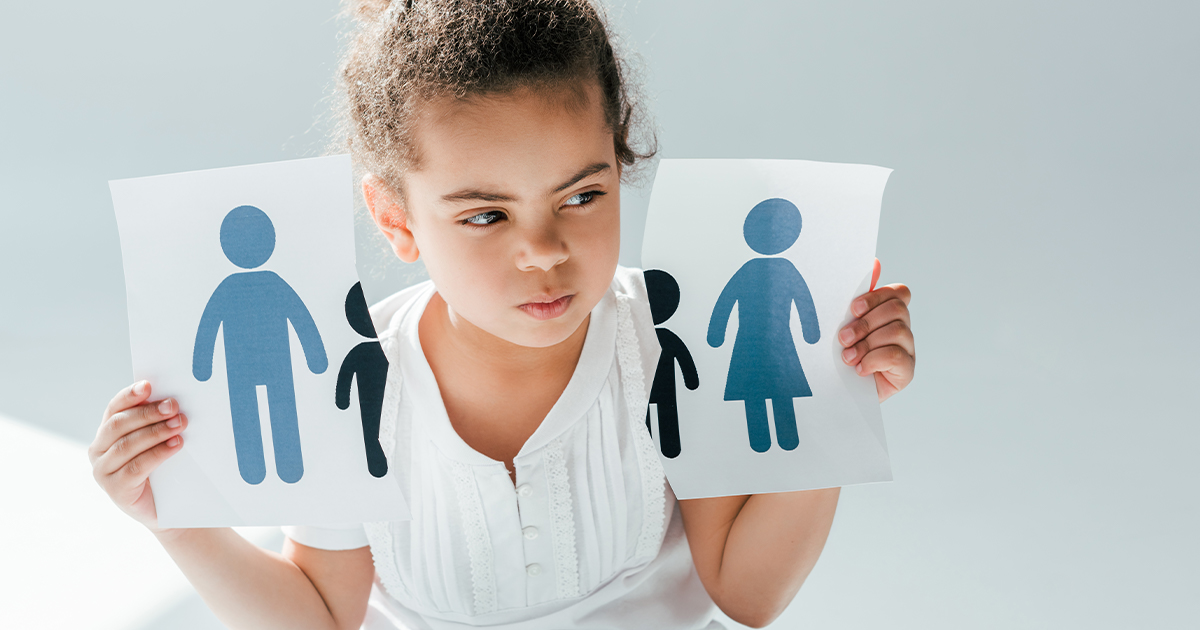 (University of Missouri)
(University of Missouri)
Helping Children Adjust to Divorce: A Guide for Teachers – Guiding children through the transition time after a divorce. (University of Missouri)
A Kid’s Guide to Divorce – Answers children’s most common concerns and questions. (KIdsHealth)
Dealing with Divorce – Ways for teens to cope with their parents’ divorce. (KidsHealth)
Last updated: December 5, 2022
6 ways to help a child survive a parental divorce
Psychology
The divorce of two adults is always about a personal crisis for each of them. Few people realize that in fact this same crisis is an important path to transformation and acceptance of oneself in a new incarnation.
Psychologist, coach, sex therapist
But when a divorce occurs in a family with children, it is scary and painful for parents to hurt their child with this decision. ELLE.ru psychologist Safronova Sofya tells how to help children survive a divorce, as well as how to make the process of parting delicate and environmentally friendly for the whole family.
1. Do not include the child in your "parental" dialogue
The child does not experience disappointment in mom or dad, as well as the collapse of hopes, splitting of supports and bitterness that exists in the relationship between parents. In fact, every child experiences exactly what adults broadcast to him. Therefore, the main advice to parents is to calmly convey their feelings to the child, without dramatizing the separation and without dumping the function of a psychologist on the child. It should not be included in your personal experiences.
- Photo
- Getty Images
2. Help your child recognize his feelings and put them into words
It is often not entirely clear what is happening in the world of a small person, because he has not yet learned to recognize feelings, understand them and accept them. In the difficult period of divorce, each child is looking for psychological support in the form of an adult whom he can trust. Therefore, in no case do not lose contact with the child: ask him questions, ask about his feelings, dreams, fears and dreams. Delicately clarify what he means by this or that statement, what he has expectations of you and how he relates to the situation as a whole. Do not be silent, do not fill the void, let your child's emotions be. You can also go to family therapy or take the child a separate psychologist.
Therefore, in no case do not lose contact with the child: ask him questions, ask about his feelings, dreams, fears and dreams. Delicately clarify what he means by this or that statement, what he has expectations of you and how he relates to the situation as a whole. Do not be silent, do not fill the void, let your child's emotions be. You can also go to family therapy or take the child a separate psychologist.
- Photos
- Getty Images
with a psychoanalyst. Let him know that you are still caring parents and that he can rely on you, even if you are divorced. Remember that after your separation, the child has the birth of his own world, which is full of news, stories, knowledge and worries. Stay a foundation you can rely on.
- Photo
- Getty Images
4.
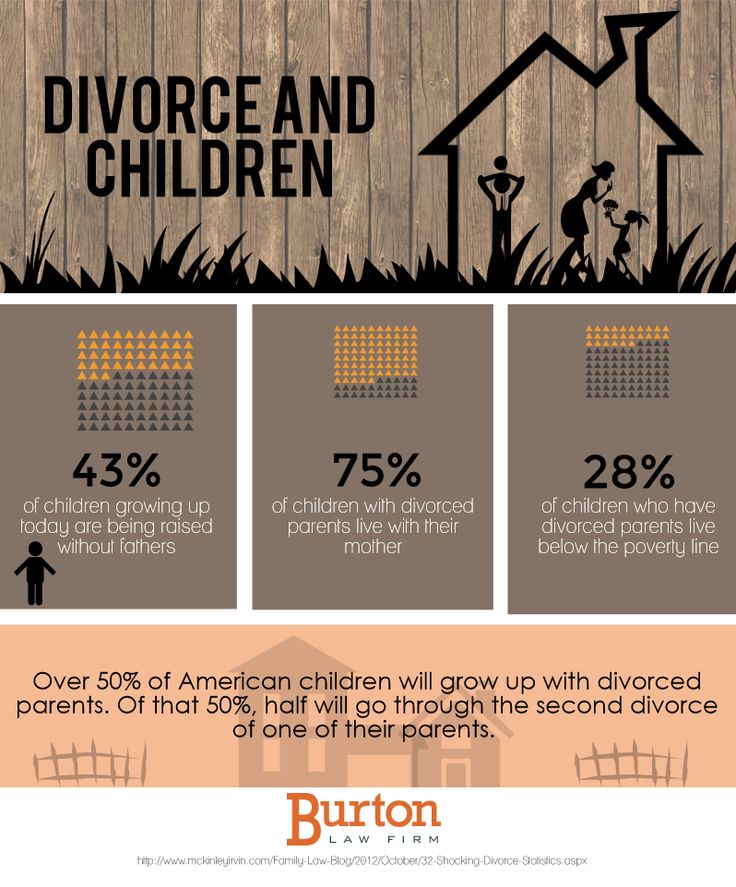 Work on your psychological state
Work on your psychological state It is really obvious to your child that the parents divorced, but in their own way. Therefore, it is important for both mother and father to develop a unified strategy for positioning the situation, which you will adhere to. For example, a mother should not rush about in passions and tell her child different versions of events a hundred times a day and change her mind. Alone with yourself or a psychologist - please. And with a child, each parent should stick to one eco-friendly version, to which his young psyche will get used. And try to attach less importance to the divorce itself. Discuss and analyze the feelings that the child experiences daily more often.
- Photo
- Getty Images
. Be honest with your feelings, but also respect the feelings of the little person. Do not convey your fears and disappointments to him, accept your weaknesses in yourself, but separately from the child.
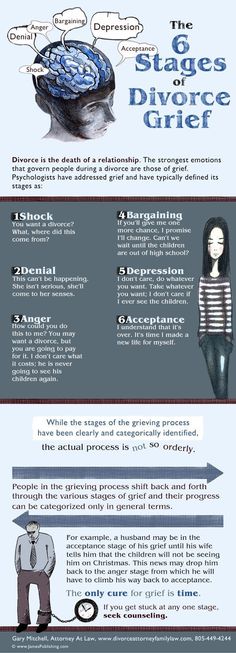 Do not give your husband's behavior and, in general, the circumstance of divorce a personal coloring: you do not know what your child will face in his life and why this experience of divorce of his parents is for him.
Do not give your husband's behavior and, in general, the circumstance of divorce a personal coloring: you do not know what your child will face in his life and why this experience of divorce of his parents is for him. - Photo
- Getty Images
6. Communicate with your child on various topics and fill life with events
It is important to understand that divorce occurs with parents, but the child's life continues to go on as usual. Of course, the very situation of parting with the numerical amendments in the family has a place to be, but all the disappointments are yours. Your child will appropriate his own disappointments through his experience. Often, parents transfer their sorrows to the child, heaping on small shoulders the role of a rescuer and psychotherapist, where the child becomes a subject for manipulation. This is scary and toxic. Therefore, it is important to communicate on topics that are interesting to your child, and leave your problems and stress for consultation with a therapist.
Therefore, it is important to communicate on topics that are interesting to your child, and leave your problems and stress for consultation with a therapist.
Yuliya Lifanova
Tags
- Divorces and separations
6 tips from a psychologist to help a child survive a parent's divorce - light blog
Perhaps now the grandmother will pick up the child after school, or you will be forced to work on weekends. An accessible explanation of the changes will reduce the level of tension and stress.The unknown is scary. When you explain what will change and who will take on new roles (grandmother, nanny, tutors), the child will be better able to navigate the situation and be able to calm down.
Divorce is often perceived by children as the loss of a father who will no longer live with you.
It is worth reminding the child: “Even though we don't live together, dad and I love you very much and want to spend time with you. You and dad can go to the park on Saturday. And I’ll buy pizza, and then we’ll watch a cartoon together.”
You and dad can go to the park on Saturday. And I’ll buy pizza, and then we’ll watch a cartoon together.”
Such reminders that not only you, but also the father loves the child, help the son or daughter feel valued for both of you.
Also, you do not form a negative image of the father in the eyes of the child.
If the father does not communicate with the child after the divorce, try to share his sadness.
Explain that it's okay to be upset and miss someone important.
Does the child say that he is angry with you? Ask about the reasons and how to help him. Sometimes kids get angry when they don't understand something. There is a chance that after finding out the reasons, you can talk openly and allay the fears.
Your very presence and opportunity to share experiences is very essential for a child. Don't deny his pain or desire to cry. He is going through a difficult period, just like you, and has the right to experience different emotions.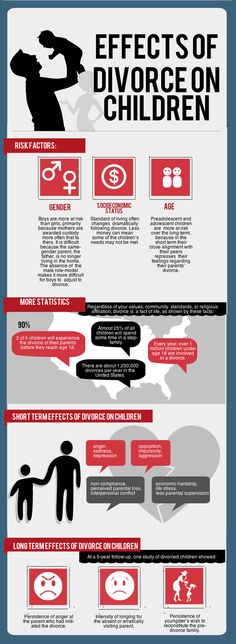
It is very important to understand the condition you and your child are in. Children react differently to the divorce of their parents, but there are a number of patterns.
Back in 1969, Swiss-born American psychologist Elisabeth Kübler-Ross described the stages that go through those who experience grief.
Divorce brings changes and losses in the family. Therefore, it is likely that the child or you can deny the situation.
Then anger may come : self, partner or child. Sometimes such anger is irrational.
Bargaining as the third stage manifests itself in the fact that you (or the child) think: “What would happen if ...?”, scroll through the many options: how you could change the situation or prevent a divorce.
After trading, a significant decline in strength and emotions may occur, that is, a depressive state . During this period, a person is very hurt, there is an understanding that the situation cannot be changed.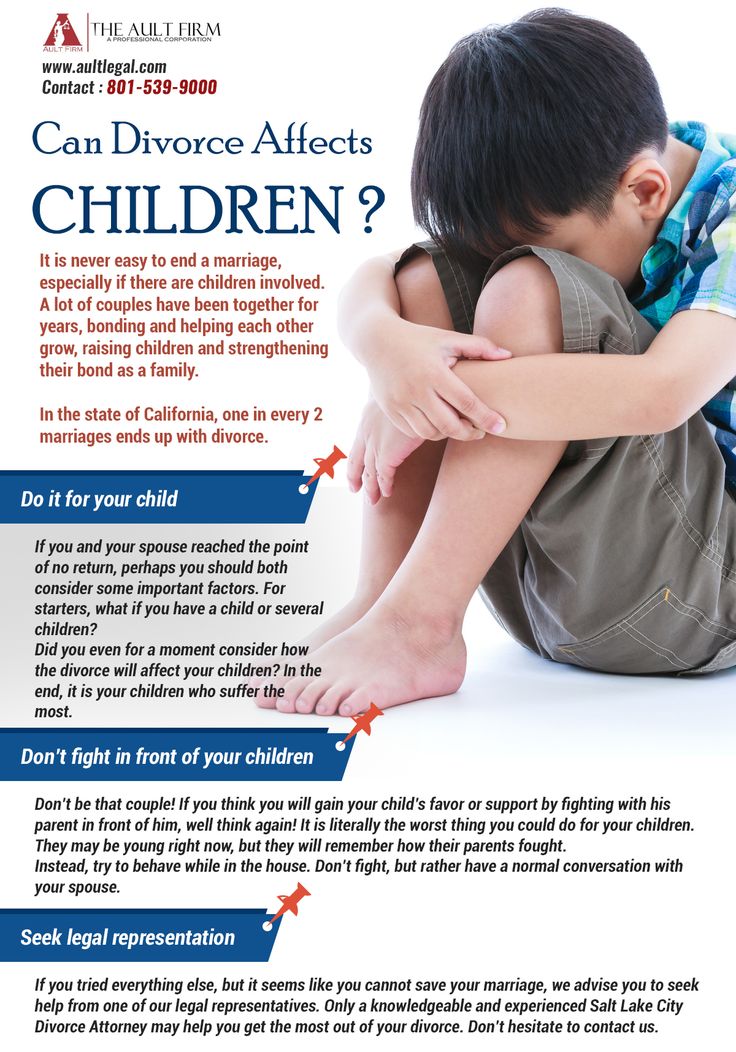 As a rule, then comes acceptance.
As a rule, then comes acceptance.
At the bidding stage, the child thinks and plays various thoughts in his vivid imagination: “Perhaps dad would have stayed with us if I had been more polite?”, “Maybe our family would have continued together if I hadn’t capricious?
The child may believe that it was he who led the parents to now live separately. He is tormented by various suspicions and experiences that are not always possible to clearly formulate for others.
That is why it is necessary to support the child in every possible way, emphasizing that it is not his fault in what happened.
Of course, it is worth talking about it when you notice that the child is trying to tell you or show his guilt.
Sometimes feelings or negative emotions overwhelm us. At such moments, we feel defenseless and can hurt those around us.
Adults can turn on critical thinking and guess that you are in pain, so you take it out on others, but in fact it is not their fault.